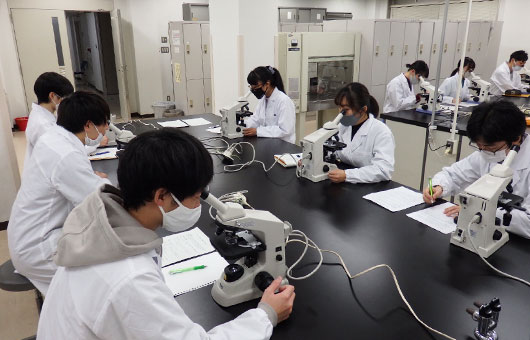Program of Biological Science 生物科学プログラム

- Home
- Program of Biological Science
The Program of Biological Science is grounded in an educational and research philosophy that seeks to elucidate the functional relationships involved in information transmission—essential for maintaining the complex structures and organization of living organisms.
Through our educational and research activities, we aim to nurture individuals who can deepen their understanding of life phenomena and gain insight into both the universality and diversity of life through active, inquiry-based learning.
Curriculum
Modern biological science encompasses a wide range of studies on living organisms and the environments in which they exist.
To understand the diversity of life phenomena, students require not only a solid foundation in biology but also broad knowledge in related natural sciences such as mathematics, physics, chemistry, earth science, and environmental science.
From the second year onward, students enrolled in the Program of Biological Science build upon the broad scientific foundation acquired in their first year and develop specialized knowledge and technical skills in biology through advanced lectures and hands-on laboratory work.
Under the guidance of faculty members with expertise ranging from molecular biology to ecology, students undertake graduation research projects, gaining deeper professional insight and practical skills that culminate in the completion of their undergraduate education.
Fields of Study
Biological Field of Diversity and Evolution
In nature, organisms do not exist in isolation but under the influence of various environmental factors such as climate and geography, as well as through interactions with individuals of the same or different species.
This field aims to understand evolution by investigating the mechanisms and factors underlying these interactions, and by studying speciation based on the diversity of reproductive modes and life histories.
Our research covers a wide range of organisms, including microorganisms, insects, plants, fishes, amphibians, birds, and mammals.
<Research Areas>
Symbiotic Biology, Applied Entomology, Evolutionary Biology, Evolutionary Developmental Biology, Molecular Ecology, Conservation Biology, Plant Cytotaxonomy
Biological Field Focused on Plants
Understanding the diverse biological phenomena of plants is fundamental to advancing the scientific and technological development required for biodiversity conservation and the realization of a sustainable society.
In this field, students engage in research from multiple perspectives using various experimental methods focused on plants.
Research topics include organ formation of leaves and roots, mechanisms of morphogenesis at the tissue and cellular levels, regulation of valuable plant compounds and agronomic traits, effects of the environment on plant life cycles, and mechanisms of disease resistance in plants.
Education and research extend from the gene level to the population level.
<Research Areas>
Plant Molecular Biology, Plant Morphology, Plant Physiology, Genetics and Plant Breeding, Plant Cell Biology, Plant Pathology, Space Biology



Field of Comparative Endocrinology, Animal Physiology, and Neuroethology
In fishes and amphibians, innate behaviors—such as feeding, emotional, and reproductive activities—as well as osmotic regulation are orchestrated by the endocrine and nervous systems.
Our research aims to uncover the mechanisms governing these processes, with a particular focus on the signaling pathways and functional roles of hormones, neurotransmitters, and their receptors in both central and peripheral tissues.
Using model organisms including goldfish, zebrafish, medaka, and Xenopus frogs, we conduct studies spanning molecular to organismal levels. These investigations encompass behavioral analyses, gene expression profiling, morphological mapping of neural networks, intracellular signaling pathways, and the pathogenesis and progression of disease states.
We also actively pursue international collaborations with leading universities and research institutes in Japan and worldwide.
<Research Areas>
Comparative endocrinology, Physiology, and Neuroethology
Field of Molecular and Cellular Neuroscience Focusing on Circadian Rhythms and Sleep-wake Behaviors
Nearly all physiological functions in animals such as sleep-wake cycles, feeding, and body temperature levels are temporally-coordinated by the central circadian clock. To elucidate the underlying mechanisms, our researches approach from the level of intracellular organelles (mitochondria) to the whole body using a wide variety of techniques. These include real-time qPCR, electrophysiology, bio-imaging, EEG/EMG-based sleep analysis and locomotor activity monitoring. We use diverse organisms such as rodents (mice, rats, and African grass rats), insects (Drosophila), and cultured human cells.
<Research Areas>
Chronobiology, Neurophysiology, Sleep Science, Behavioral Pharmacology


